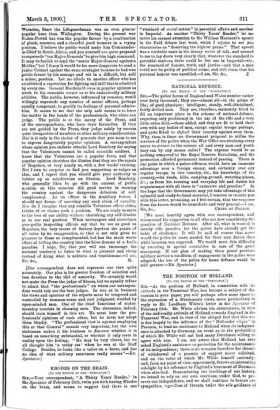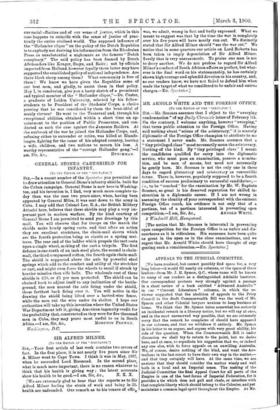THE POSITION OF HOLLAND.
[To TILE EDITOR OF THE "SPECTATOR."]
Sin—As the position of Holland, in connection with its attitude in the Transvaal War, has become a subject of dis- cussion in your paper, you will perhaps allow some space to the expression of a Dutchman's views, more particularly in reply to Mr. Leedham White's letter in the Spectator of February 24th. Mr. White advises his countrymen, in view of the unfriendly attitude of Holland towards England in the Transvaal War, and in view of the alleged fact that this war is due largely to the influence of the " Hollander clique" in Pretoria, to lend no assistance to Holland when its independ- ence is attacked by Germany, an event as to the probability of which Mr. White will not find many Dutchmen willing to agree with him. I am not aware that Holland has ever asked England's assistance or protection for the maintenance of its independence; there is no occasion therefore for threats of withdrawal of a promise of support never solicited, and on the value of which Mr. White himself curiously, and, from my point of view, opportunely, throws an interesting sidelight by his reference to England's treatment of Denmark when attacked. Remembering the teachings of our history, we intend to rely on our own exertions, under God, to pre- serve our independence, and we shall continue to bestow our sympathies, -egardless of threats, under the sole guidance of our racial effinities and of our sense of justice, which in this case happens to coincide with the sense of justice of prac- tically the entire civilised world. The supposed influence of the " Hollawier clique" on the policy of the Dutch Republics is to anybody not deriving his information from the Rhodesian Press as unsubstantial a nightmare as the famous "Dutch conspiracy." The said policy has been framed by Dutch Afrikanders like Kruger, Steyn, and Reitz ; not by officials imported from Holland, however loyally these latter may have supported the established policy of national independence. Are there black sheep among them ? What community is free of them ! We know we have given the Republics some of our best men, and gladly, to assist them in that policy. May I, in conclusion, give you a hasty sketch of a prominent and typical member of the " Hollander clique,"—Dr. Coster, a graduate of Leiden University, selected by his fellow- students to be President of the Students' Corps, a choice proving that he was considered by them the bean-ideal of manly virtues? He went to the Transvaal and, through his exceptional abilities, obtained within a short time an ap- pointment to the position of Public Prosecutor, and con- ducted as such the case against the Jameson Raiders. At the outbreak of the war he joined the Hollander Corps, and, refusing either to surrender or retire, was killed at Elands- ]aagte, fighting for the cause of his adopted country, leaving a wife, children, and two nations to mourn his loss. A worthy representative of the "corrupt Hollander gang."—I







































 Previous page
Previous page